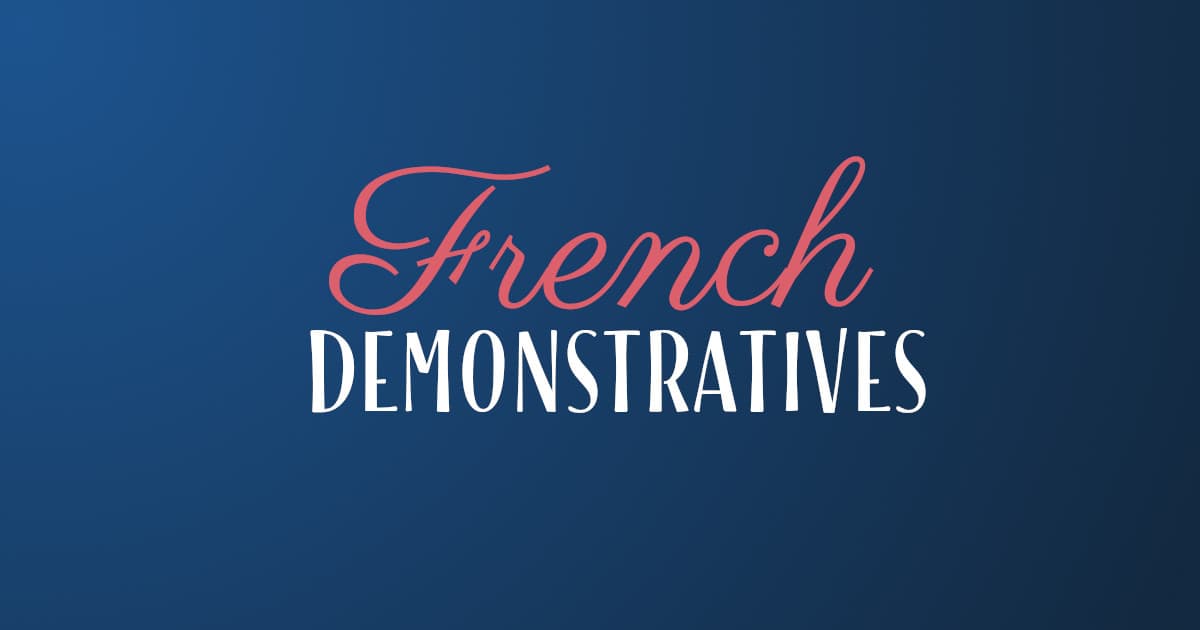How To Learn French Demonstrative Indefinite Pronouns
Demonstrative pronouns:
These words in French are used in place of things/persons/concepts/places that are pointed to. Their English equivalents are:
this/these and that/those.
Grammatically, demonstrative pronouns stand in for the combination (noun + demonstrative adjective).
| Masculin singulier | Masculin pluriel | Féminin singulier | Féminin pluriel |
|---|---|---|---|
| Celui /this one | Ceux /these/those ones | Celle /This one | Celles /these/those ones |
Whereas in English, demonstrative pronouns remain invariant, in French they vary with gender and number.
Examples:
Je voulais emprunter la voiture. Celle qui étais garée au bout de la rue. / I wanted to borrow the car. The one parked at the end of the street.
Il voulait m’emprunter $10 000, ce qui me semblait excessif. / He wanted to borrow $10,000, which seemed excessive.
In addition to the pronouns in the table above, a neutral demonstrative pronoun also exists: ce.
Ce is used mostly in combination with être, and other “fixed expressions” (ce dont/ this…which, ce que/ this…that) as a grammatical presentation device.
Examples:
C’est un chat. / This is a cat.
Ce sont les amis dont je t’ai parlé. / These are the friends whom I spoke to you about.
Demonstrative pronouns can be reinforced with the addition of -ci (here) and -là (there) (celui-ci, celui-là, celle-ci, celle-là, ceux-ci, ceux-là)
Example:
Celle-ci est arrivée en retard. / This one here arrived late.
Celui-là, on ne peut pas lui faire confiance. / This one there cannot be trusted.
The reinforced neutral forms of ce are : ceci, and cela. Note that there is no accent on the a of cela.
Simple: Ce n’est pas possible. / This is not possible.
Reinforced: Ceci n’est pas possible. / This here is not possible.
2) Pronoms indéfinis
Indefinite pronouns refer to and stand for vague/incompletely/indefinite known objects/persons/categories.
a) Simple Forms
Note that each of the following pronouns is variable in number and gender. (m =masculin, f=feminine, s=singular, p=plural). Some can be used for all numbers and genders, others are specific.
Aucun(e) / no one
Autre(e)(s) / mostly other-thing)
Autrui / only other-person
Certain(e)(s) / some
Chacun(e) / each
Même(s) / same
Nul(le)(s) / none
On / some, it
Personne / no one
Plusieurs / many
Quelqu’un(e) — Quelques un(e)(s) / someone — some people
Qui / who
Quiconque / anyone
Rien / nothing
Tel(le)s / such
Tout(e)(s) / all
Un(e)(s) / ones
Examples:
Beaucoup de gens jouent à la lotterie. Certains la gagne. / Many people play the lottery. Some win it.
Personne ne peut traverser le pont. / No one can cross the bridge.
Rien ne va plus. / Nothing is going well.
b) Locutions (short conventional expressions) with indefinite pronomial values (ie can be used as indefinite pronouns):
Autre chose / other thing
Dieu sait qui**/quoi/où/lequel… /** God knows who/what/where/which one…
Grand-chose / almost nothing
Je ne sais combien / I don’t know how much
La plupart / most
N’importe qui**/quoi/où/lequel…** / whoever/whatever/whereever/whichever…
**On ne sait qui/****quoi/**où/lequel… / No one knows who/what/where/which one…
Peu de chose / little
Quelque chose / something
Qui de droit / to whom it may concern
**Qui/**quoi/où… / who, what, where…
**Qui/****que/**où que ce soit / who/what/where…soever
Tout le monde / everybody
Examples:
Je ne sais combien de soldats sont passés par ici. / I don’t know how many soldiers passed through here.
Tout le monde se repose à Thanskgiving. / Everyone rests on Thanksgiving.
3) Some adverbs can also be used as indefinite pronouns
Assez / enough**;** Autant / as much**;** Beaucoup / much, many**;** Davantage / more**;** Guère / few, little**;** Peu / little**;** Tant / so much , so many
Examples:
Vous en savez assez pour passer l’examen. / You know enough to pass the exam.
Il y en a autant que je voulais. / There is as much as I wanted.

SUBSCRIBE: